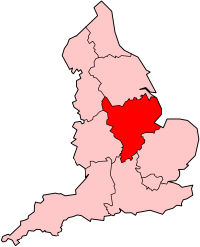Castle Donington Power Station
| Castle Donington Power Station | |
|---|---|
 Castle Donington Power Station | |
 | |
| Country | England |
| Location | Leicestershire, East Midlands |
| Coordinates | 52°50′52″N 1°21′31″W / 52.847769°N 1.358511°W |
| Status | Decommissioned |
| Construction began | 1951 |
| Commission date | 1956–58[1][2] |
| Decommission date | 1994[3] |
| Operator(s) | Central Electricity Generating Board (1958–1990) Powergen (1990–1994) |
| Thermal power station | |
| Primary fuel | Coal |
| Chimneys | 2 |
| Cooling towers | 4 |
| Cooling source | River water and cooling towers |
| Power generation | |
| Units operational | 6 × 100 MW |
| Make and model | Metropolitan-Vickers |
| Units decommissioned | All decommissioned |
| Nameplate capacity | 600MW |
| Annual net output | 2,072 GWh (1980-81) |
grid reference SK433280 | |
Castle Donington Power Station was a coal-fired power station situated on the River Trent near Castle Donington, Leicestershire, 5 miles (8.0 km) south-east of Derby. Construction began in 1951, and the station opened in 1958.[4]
History[edit]
The station had six 100 megawatt turbo-generators manufactured by Metropolitan-Vickers and boilers by Babcock & Wilcox. The boilers operated on pulverised coal and delivered 630 kg/s of steam at 103.4 bar and 566 °C. Station cooling was by river water and four cooling towers. Castle Donington was one of the CEGB's twenty steam power stations with the highest thermal efficiency; in 1963–4 the thermal efficiency was 32.30 per cent, 31.57 per cent in 1964–5, and 31.45 per cent in 1965–6.[5] In 1980/1 the station sent out 2,072.453 GWh, the thermal efficiency was then 29.34 per cent. It was initially operated by the Central Electricity Generating Board. Following privatisation in 1990, the station was operated by Powergen. In 1993, four of the station's generating units were decommissioned. In 1994, the remaining two units were taken out of operation and the station closed down.[6]
Castle Donington power station was supplied with coal via a branch off the adjacent Trent and Weston railway line. Rail facilities included an east-facing junction on the mainline, four loading arrival sidings, a gross-weight weighbridge, a four-track set of unloading hoppers, a tare-weight weighbridge, and four empty departure sidings.[7]
The cooling water system enabled the abstraction of up to 113,700 m3/h (25 million gallons per hour) of water from the River Trent. There was provision for up to 81,800 m3/h (18 million gallons per hour to be pumped from the outlet channel through cooling towers back to the inlet channel for reuse.[8]
The power station's internal railway system had the last steam locomotives in regular industrial usage in Great Britain.[9][10] The two 0-4-0 saddle tank locos were built in 1953 by Robert Stephenson and Hawthorns Ltd and went into preservation upon the power station's closure with No. 1 now on the Midland Railway in Derbyshire.
The annual electricity output, in GWh, of Castle Donington was:[5][11][12]
Graphs are unavailable due to technical issues. There is more info on Phabricator and on MediaWiki.org. |
| Year | 1957 | 1958 | 1959-60 | 1960-1 | 1961-2 | 1962-3 | 1963–4 | 1964–5 | 1965–6 | 1966–7 | 1971–2 | 1978–9 | 1980–1 | 1981–2 |
|---|---|---|---|---|---|---|---|---|---|---|---|---|---|---|
| Electricity supplied, GWh | 130.9 | 1,255 | 4,208 | 4,215 | 4,081 | 4,439 | 4,505 | 4,196 | 3,778 | 3,652 | 1,919 | 2,062.8 | 2,072.4 | 2,090 |
The power station has since been demolished and a distribution centre for Marks & Spencer has been developed on the site.
References[edit]
- ^ "Castle Donington Conservation Area Appraisal and Study" (PDF). North West Leicestershire District Council. Retrieved 2008-03-04.
- ^ Clarke, Jonathan (2013). High merit: existing English post-war coal and oil-fired power stations in context. London: Historic England. p. 10.
- ^ "NATIONAL GRID COMPANY PLC – CONSTRUCTION OF A NEW SECTION OF 400Kv OVERHEAD LINE, CASTLE DONINGTON ELECTRICITY SUB-STATION (NORTH WEST LEICESTERSHIRE DISTRICT)" (PDF). 13 March 2003. Retrieved 30 September 2020.
- ^ "Power to the People". Retrieved 30 September 2020.
- ^ a b CEGB (1966). CEGB Statistical Yearbooks 1964, 1965, 1966, 1972, 1982. London: CEGB. p. 20.
- ^ "Generation disconnections since 1991". National Grid. 2003. Archived from the original on 5 December 2012. Retrieved 5 October 2008.
- ^ Jacobs, Gerald (1990). London Midland Region Track Diagrams. Exeter: Quail. pp. 6C. ISBN 0900609745.
- ^ Sheail, John (1991). Power in Trust. Oxford: Clarendon Press. p. 65. ISBN 0-19-854673-4.
- ^ "Lines of Industry". The Train Now Departing. 13 December 1988. BBC Two. Retrieved 25 October 2021.
- ^ "The train now departing, Castle Donington power station 1988". You Tube. Retrieved 30 July 2018.
- ^ Garrett, Frederick C., ed. (1959). Garcke's Manual of Electricity Supply vol.56. London: Electrical Press. pp. A-117.
- ^ GEGB Annual report and accounts, various years
External links[edit]
- Photos of Castle Donington on Power Stations Revisited.

